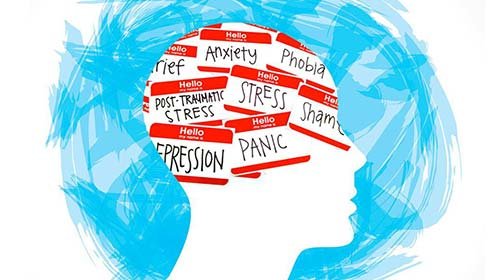How Negative Thinking Impacts Our Body?

Although mind and body are often considered independent entities, mental and physical health are in fact inextricably linked. While positive thinking has been shown in studies to enhance mental health, reduce stress, and even contribute to improved cardiovascular health, chronic stress disrupts the body’s hormone balance, depletes the brain chemicals necessary for happiness, and harms the immune system. Poorly controlled emotions or suppressed anger is linked to a variety of health problems, including hypertension (high blood pressure), cardiovascular illness, digestive difficulties, and infections.
Negative thinking is characterized by a predisposition to think negatively about oneself and one’s surroundings. While everyone has negative thoughts from time to time, negative thinking that significantly influences how you think about yourself and the world around, and even interferes with work/study and daily functioning, impacts the brain and neurological system, which in turn affects the entire body. This recurring tendency causes emotional distress as well as the gradual internalization of negative emotional patterns.
Negative emotions and ideas may quickly become a habit. If you continue to reward bitter, pessimistic, jealous, or angry reactions to everyday life, your brain will begin to respond in the same manner to everything. These negative reinforcement patterns have been found to have an impact on everything from hormone health to heart health, gastrointestinal health, numerous illnesses, and disease recovery.
Additionally, if you are experiencing unpleasant emotions, you will resort to destructive coping mechanisms like resorting to addictions like smoking, alcohol, promiscuous sex, etc. and that will make it more difficult to pull yourself back.

Three main factors have been consistently observed in several studies following persons with tendency to negative thinking patterns, in parallel with the three main time stages, namely, past, present and future.
Past. Everyone does and says things they are ashamed of at some point in their lives, but when taken negatively some people tend to concentrate on previous errors and failures more than others. Also life does have its share of pains and traumas and one has to rise beyond them to focus on the lessons imbibed from them. This is particularly found in the case of depression, a mental health issue entirely based on experiences from the past.
Present. Many of us are concerned about what others think of us, or if we are doing a good job at work or how we will get home in traffic. We imagine that no one loves us or is there for us or that the we are being attacked, blamed or criticized for no fault of ours. Many issues stem because we fear that we have no control over our surroundings.
Future. People often dread the unknown and are apprehensive of what the future may hold. This often leads to “catastrophizing,” or continually forecasting failure and calamity. Anxiety disorders are associated with apprehension to the future.
Negative thinking of the past imbalances the Muladhara chakra, that of the present imbalances the Swadhisthana chakra and that of the future imbalances Manipura chakra. The impact of these further affect the upper chakras namely Anahata of trust, Vishuddha of being present in the here and now, Ajna of acceptance and Sahasrara of gratitude and hope.

Cardiovascular disorders caused by negative emotions, notably despair, anxiety, vital weariness and aggression is today widely supported by medical research. In addition, both clinical depression and anxiety are commonly seen in this type of physical diseases. Vital fatigue (a combination of energy loss, increased irritability, and overall demoralization) has been found in multiple studies to be the cause of myocardial infarction and coronary heart disease, in both sexes.
Research suggest that anger repression and destructive anger expression (blaming others) are both connected with an increased risk of coronary heart disease as well. Evidence suggests that the association between negative emotions and cardiovascular disorders is a two-way causation, which means that the existence of a cardiovascular disease may also increase negative emotions, with poor heart rate variability playing a critical part in both diseases.
Besides cardiovascular disorders, it has been largely observed how anxiety may cause digestion issues. Resentment has the potential to create a liver crisis. The inability to process negative emotions may cause a urinary infection. Ear infections and ear discomfort might occur when we refuse to listen to anything. Angina and painful throat might occur when you do not dare to speak anything. If you fear instability in personal or professional life you may have knee issues. Lower back discomfort may occur if you feel unsafe and not in harmony in relationships. Neck discomfort and stiffness are caused because of pent up frustration and by not speaking up. When you take on everything on your own, you run the danger of developing shoulder pain and being overweight. Anxiety about the future, as well as the urge to slow down, may produce discomfort in the legs, feet, and ankles.
Stress, particularly chronic stress, which is common in today’s society, has been linked to hypertension, digestive problems, skin problems, and a weakened immune system response, which in turn leads to infections.

One needs to cope with difficult emotions such as pain, sadness, frustration, and grief without crumbling. Those who handle these emotions, do not ignore their sorrow or suffering; rather, they maintain a feeling of optimism that helps them overcome the physical repercussions of their condition. In reality, some individuals may look at difficult times with optimism and hope, believing that their trials will lead to personal development and a broader perspective on life.
It is vital to be conscious of your ideas and emotions. You may then track them back to their source and determine what is causing them. Maybe it’s a certain time of the day, maybe it’s a certain person, maybe it’s an action you perform or something you do on a regular basis that doesn’t make you feel good; whatever it is, it’s most likely creating the uneasiness, sadness, or emotional and mental negativity that correlates with physical aches, pains and ailments.
Healing is an internal responsibility; no one can cure you unless you have a genuine and sincere desire to become responsible for your life. Whether it is about a physical pain or sickness, the stresses of life, or emotional issues in a relationship, connecting with your true self is your greatest bet. Being self-aware entails paying attention to everything about yourself on the inside. Your body, mind, and emotions.
Self-awareness of your ideas and emotions entails paying attention to them without shame, judgment, or guilt. You maintain your distance as if you were viewing a stranger or listening to a buddy confide in you. This detachment enables you to examine the idea or feeling as if you were solving a problem whose answer has no bearing on you.
Healing is brought about through self-awareness and faith in oneself.

Chakra Yog’s Knowledge base has evolved from Advaita Vedanta teachings and from Bhagwat Gita’s four paths to Union.
Connect With Us

Chakra Yog,
C-309, Neelkanth Business Park, Nathani Road, Behind Vidyavihar Railway Station, Vidyavihar (W),
Mumbai – 400086, Maharashtra, India.

Open: Monday – Friday: 8.00am – 7.00pm
Close: Saturday – Sunday – Holiday



